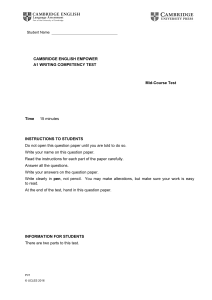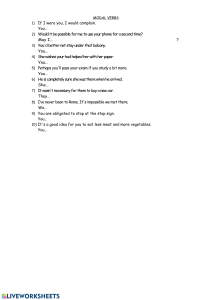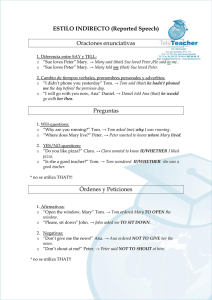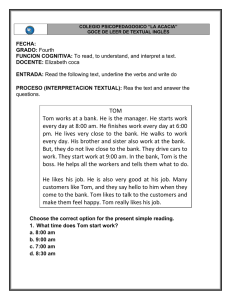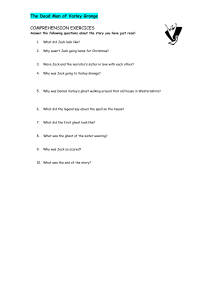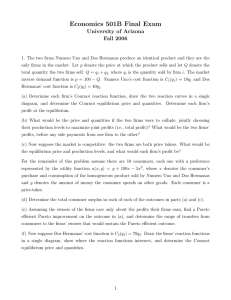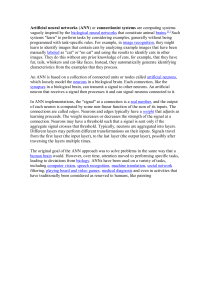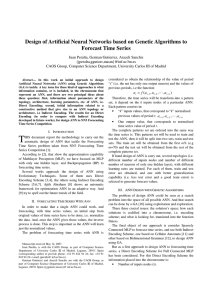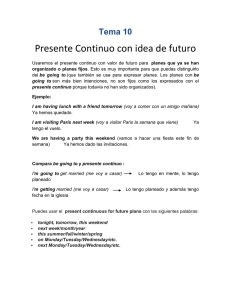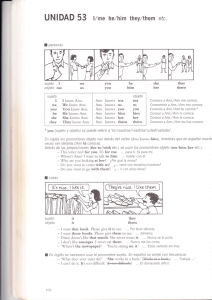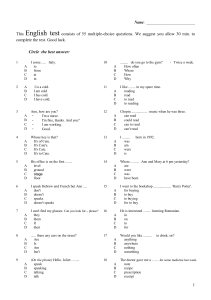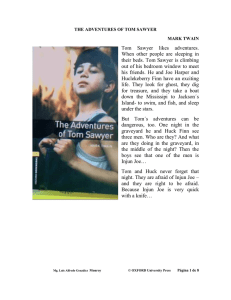English exercices
Anuncio
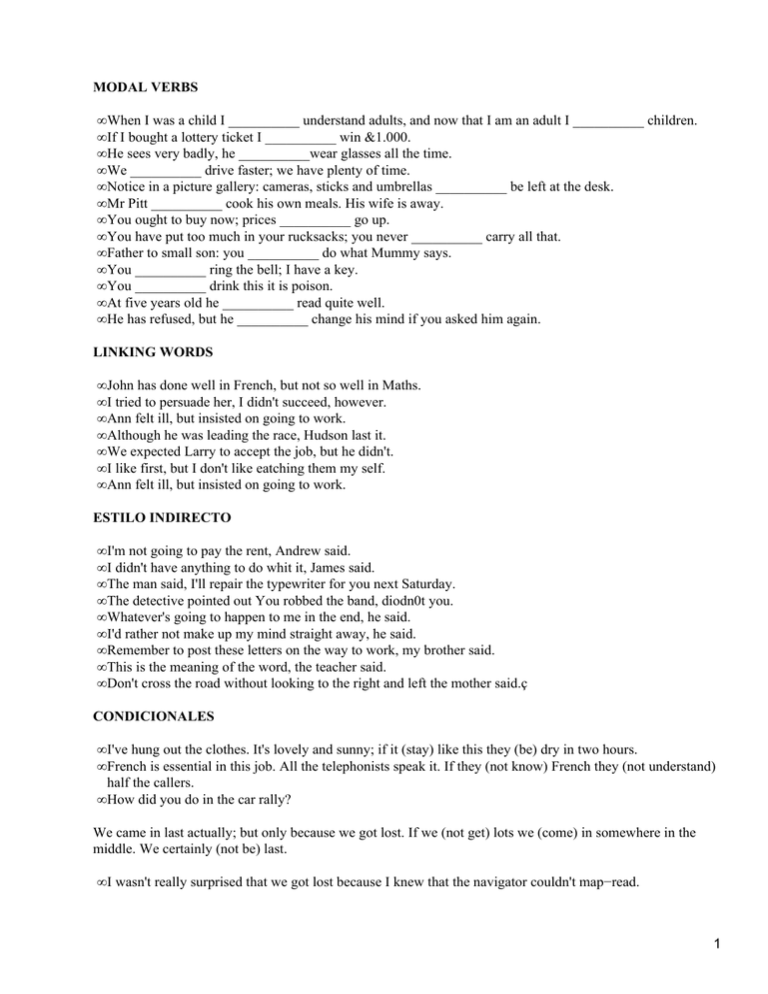
MODAL VERBS • When I was a child I __________ understand adults, and now that I am an adult I __________ children. • If I bought a lottery ticket I __________ win &1.000. • He sees very badly, he __________wear glasses all the time. • We __________ drive faster; we have plenty of time. • Notice in a picture gallery: cameras, sticks and umbrellas __________ be left at the desk. • Mr Pitt __________ cook his own meals. His wife is away. • You ought to buy now; prices __________ go up. • You have put too much in your rucksacks; you never __________ carry all that. • Father to small son: you __________ do what Mummy says. • You __________ ring the bell; I have a key. • You __________ drink this it is poison. • At five years old he __________ read quite well. • He has refused, but he __________ change his mind if you asked him again. LINKING WORDS • John has done well in French, but not so well in Maths. • I tried to persuade her, I didn't succeed, however. • Ann felt ill, but insisted on going to work. • Although he was leading the race, Hudson last it. • We expected Larry to accept the job, but he didn't. • I like first, but I don't like eatching them my self. • Ann felt ill, but insisted on going to work. ESTILO INDIRECTO • I'm not going to pay the rent, Andrew said. • I didn't have anything to do whit it, James said. • The man said, I'll repair the typewriter for you next Saturday. • The detective pointed out You robbed the band, diodn0t you. • Whatever's going to happen to me in the end, he said. • I'd rather not make up my mind straight away, he said. • Remember to post these letters on the way to work, my brother said. • This is the meaning of the word, the teacher said. • Don't cross the road without looking to the right and left the mother said.ç CONDICIONALES • I've hung out the clothes. It's lovely and sunny; if it (stay) like this they (be) dry in two hours. • French is essential in this job. All the telephonists speak it. If they (not know) French they (not understand) half the callers. • How did you do in the car rally? We came in last actually; but only because we got lost. If we (not get) lots we (come) in somewhere in the middle. We certainly (not be) last. • I wasn't really surprised that we got lost because I knew that the navigator couldn't map−read. 1 But if you (know) that why you (take) him as navigator? • This flat would be all right if th people above us (not be) so noisy. • A group of spectators, including my self, left the stand just before the end of the game. When we were half way down the stairs a goal was scored and there was a great cheer from the spectators. If there (not be) a goal the crowd (not cheer). • If the crowd (not cheer) we (not run) back up the stairs to see what had happened. • If we (not run) back we (not crash) into the rest of the spectators on their way down, and there (not be) this frightful accident. • If the pain (return) you'd better take another pill. PRESENT, PAST, PRESENT PERFECT: CHECK • She paid for her ticked and __________ (leave). • I closed the door quietly because he __________ to sleep. (try) • How many times __________ since he come to New York? (he call) • I __________ about this for some time now. (Know). • They __________ television their favourite programme is on at the moment. (watch) • I wanted to be the first to tell her the news, but I was too late. Someone __________ her. (already tell) • The children are filthy. Where ? (They be). • I'm going to bed: I __________ for ours and I'm tired. (Work) • I think she's the nicest person I __________ (meet) • Mary was dealing the windscreen when she __________ a crack in the glass. (notice) • I couldn't open the office door because someone __________ it. (lock) • I agree: I __________ you should apologize. (not think). • When I phoned her, she __________ her homework. (do) • We __________for three−and−a−half hours when John finally arrived. (wait) • When I shouted, they __________ off the roof and __________ away (jump / run). RELATIVE CLAUSES • Boris Becker is a tennis player. He won the Wimbledon championship when he was eighteen year old. • I was reading about the Atacama Desert. It's the driest place in the world. • There's that new restaurant. I went there yesterday. • Have you met John Smith? His sister can speak fourteen languages. • Romeo and Juliet were lovers. Their parents hated each other. • Intrepid Fox is a bar. Tom usually goes ther for lunch. • I was sitting in a chair. It suddenly collapsed. • A man answered the phone. He said Tom was out. • He introduced me to his students. Most of them were from abroad. • We'll have to get across the frontier. This will be difficult. • The Smiths were given rooms in the hotel. Their house had been destroyed in the explosion. • The lorry crashed into a bus−load of school children. Six of them were slightly injured. • They went to an agency. It was Blue skies Agency. • The matter was reported to the Chief of Police. He ordered us all to be arrested. ESTILO INDIRECTO • I'm taking my children to the zoo tomorrow, she said, to see the baby polar bear. • All I can hear, said Ann, is a high−pitched buzz. I wonder if it's some sort of signal. • Who has been using my typewriter? said my mother. • Don't put sticky things in your pockets, said his mother. 2 • Someone is trying to murder me!, said Mrs Jones, Ikeep getting threatening letters. PASIVA • The burglars have cut an enormous hole in the door. • They make these artificial flowers of silk. • Previous cut steps in the ice. • Students are doing a lot of the work. • The author has written a special edition for children. • Somebody has cleaned my shoes. • They rang the church bells. • A thief stole my dog two days ago. • Someone is serving refreshments. • Somebody has slashed the picture with a knife. • I've bought a new car. • In some districts farmers use pigs to find truffles. FUTUROS • The children (make) two hundred Unions Jacks by the end of this week. • I (remember) to buy you a present at the fair. • We think the weather (clear up) in time for the cricket match. • The musicians (come) on here stage in a minute. • By tonight they (take) a lot of money for charity at the fair. • Football (start) again in the autumn as usual. • I (meet) him again tomorrow. • The fair (have) a theme: Britain Though The Ages. • I feel sure I (win) at cards tonight. • This time next week, we (listen) to the Rolling Stones. BE GOING TO − FUTURE − PRESENT CONTINUOUS • Jack: I don't want to get married. I never (get) married. Mother: You think that now. But one day you (meet) a girls and you (fall) in love. • Where you (meet) Tom? We (meet) at Covent Garden. He (take) me to see The Magic Flute. • I've seen the film, now I (read) the book. I've just got a copy from the library. (I haven't started the book yet). • He (bring) his wife with him? (Has he arranged to bring his wife?). • I've been measuring the windows. I (put) in double glazing. • There's someone at the door. I (go). But I expect it's someone for you. • Why are you rolling up the carpets? You (paint) the ceiling? No, I (take) the carpet to the cleaner's. 3 • Take an umbrella. It (rain) • Mrs Jones (go) to hospital; she (have) her appendix out. Who (look) after the children? Her sister (come) down from Scotland. • Where (go) you for your holidays? I (go) to Norway. What you (do) there? I (fish). • Leave a note for them en the table and they (see) when they come in. • I'm afraid I'm not quite ready. Never mind. I (wait). • I (play) bridge tonight with Tom and Ann. • Where you (go) this evening? I (not go) anywhere. I (stay at home. I (write) some letters. • I (know) the result tomorrow. A soon as I hear, I (tell) you. FUTURE: WILL − GOING TO − PRESENT CONTINUOUS • I (play) bridge tonight with Tom and Ann. • I am sure that you (like) our new house. • I (have) an operation next week. • − When you (have) your next lesson? • I (have) it on Monday. • Do you think the (recognize) me? • − Where you (go) tonight? ♦ I (go) out with Peter. He (call) for me at eight. ♦ − What your father (say) when he hears about this accident? ◊ He (not say) much but he (not lend) me the car again. ◊ − What you (tell) the police? ⋅ I (tell) them the truth. ⋅ I've reminded you once; I (not do) it again. ⋅ The windows − cleaner (come) at eight o'clock tomorrow. ⋅ − Tom (arrive) tomorrow. • He (spend) the weekend here or (catch) the night train back as usual? • He (spend) the weekend. He (give) a lecture on Friday and (attend) a big reception on Saturday. • I (buy) a new coat. The weather report says that it (be) very cold. • Jack's mother: Jack (be) ready in a moment. He is just finishing breakfast. 4 Jack's father: If I wait for him any longer I (miss) my train. I think I (walk) on; he probably (catch) me up. • Peter: We'd better leave a message for Jack. Otherwise he (not know) where we've gone. George: All right. I (leave) a note on his table. • − I (do) a lot of work in the garden, too. I (plant) 20 apples trees and (make) a lawn in front of the house. ♦ All that digging will take years. You (give) up your job? ♦ I get) some help with the garden. (I have arranged this) Two men (start) work on the hedye on Friday and a lawn expert (come) on Monday to advice me about the lawn. INDIRECT SPEECH: QUESTIONS ♦ What country do you come from? said Bill. ♦ How long have you been here? said Ann. ♦ Are you working as well as studying? asked Peter. ♦ Have you got a work permit? Bill wanted to know. ♦ What are you going to study? asked Ann. ♦ Have you enrolled for more than one class? said Peter. ♦ Do you want to buy any second − hand books? said Bill. ♦ Have you seen the library? asked Ann. ♦ Do you play rugby? said Peter. ♦ Will you have time to play regularly? he went on. ♦ Did you play for your school team? sad Bill. 5
